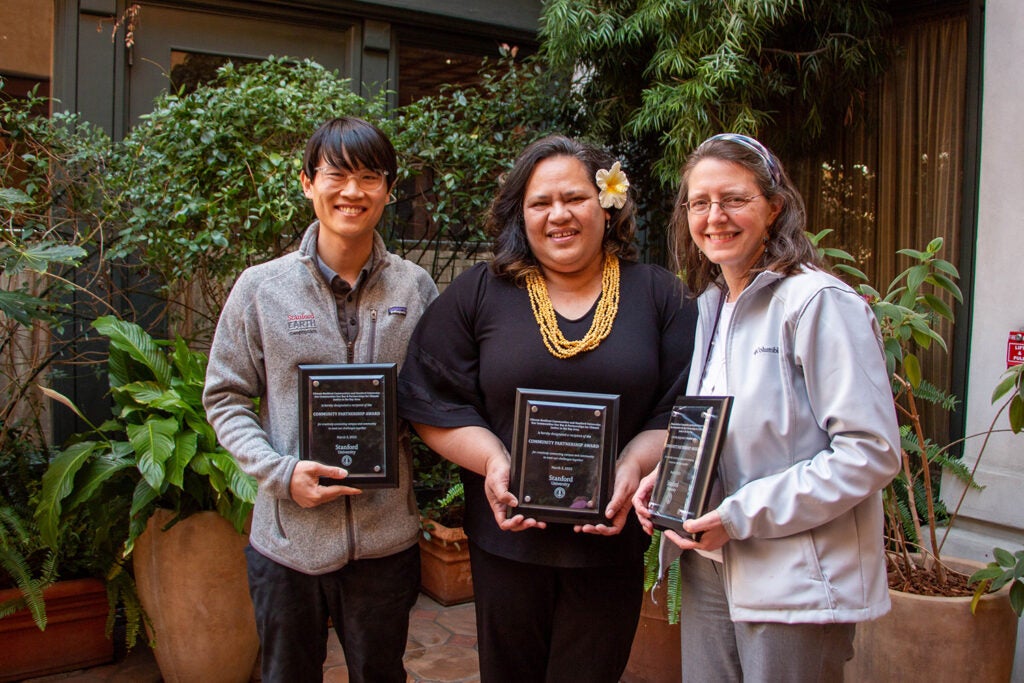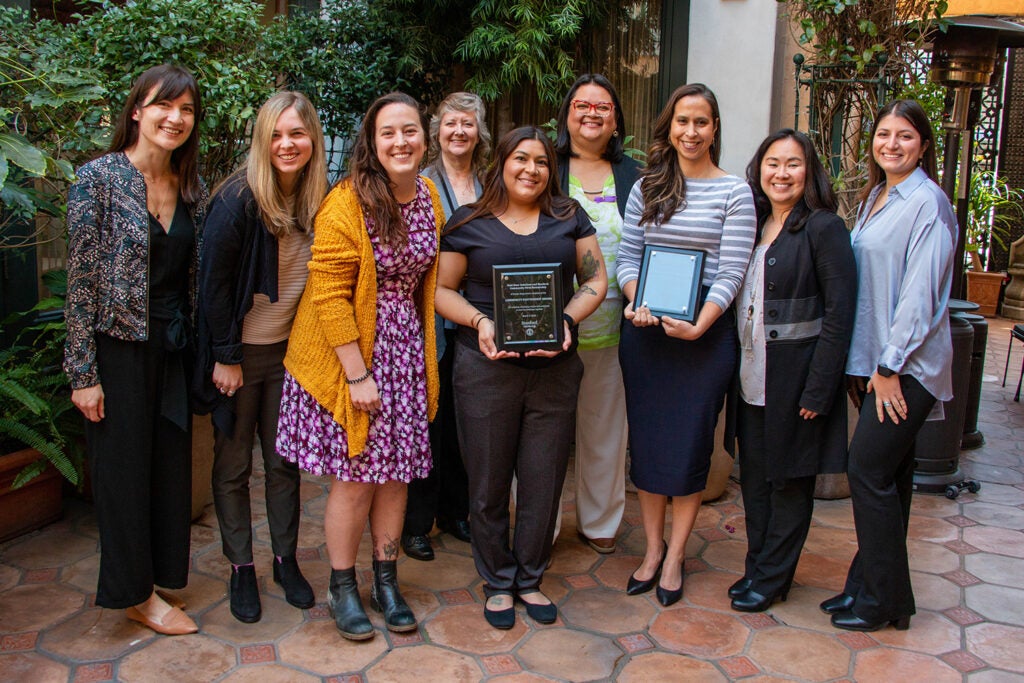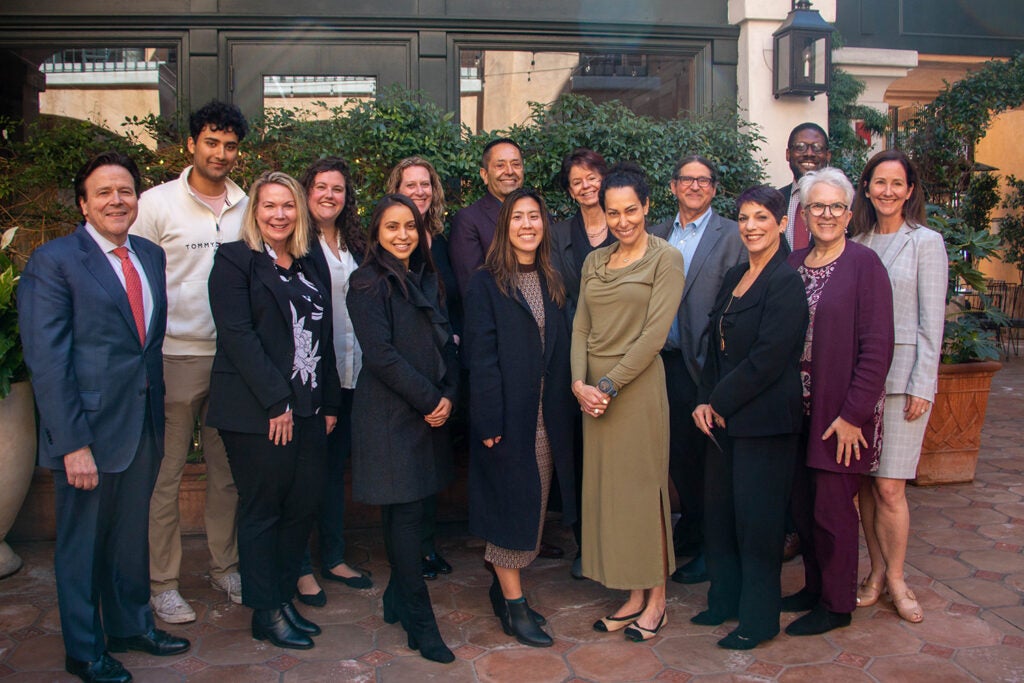2023 Stanford Community Partnership Awards announced
March 3 event recognized Stanford and community organizations working for the health and sustainability of our local region.
Partnerships between Stanford and community entities were recognized March 3 for their sustained work to support youth mental health, the needs of domestic violence survivors, and adaptation in the frontline communities that will be most impacted by climate change.
The 2023 Community Partnership Awards, administered by Stanford’s Office of Community Engagement, recognize these joint efforts in tackling problems at the community level and advancing the public good. The partner entities include the Stanford Redwood City Sequoia School Mental Health Collaborative; Next Door Solutions, which collaborated with several different departments and programs of Stanford School of Medicine; and Climate Resilient Communities (CRC), which partnered with the Stanford groups Our Communities Our Bay and Partnerships for Climate Justice in the Bay Area.
These groups are utilizing expertise and relations to solve challenges identified by community partners, said Megan Swezey Fogarty, associate vice president for community engagement. “Each of these partnerships teach us something about trust and change-making for the common good,” she said. “They show us by the way they think together and execute together to make a positive difference.”
The 2023 Community Partnership awardees were nominated by the campus community and selected by a committee comprising university and community representatives. The selection criteria included meeting a need in the region; creatively connecting campus and community; engaging faculty, staff, or students in service; and “meeting the moment.”
Stanford Vice President and Chief External Relations Officer Martin Shell presented the Community Partnership Awards at an event on March 3 that also recognized the recipient of this year’s Miriam Aaron Roland Volunteer Service Prize.
Climate adaptation in ‘frontline communities’
Violet Wulf-Saena created Climate Resilient Communities (CRC) in 2016 after observing what was happening with frontline communities where climate change impacts were already being felt. In the Bay Area, these include East Palo Alto, the neighborhoods of Belle Haven in Menlo Park, and North Fair Oaks in Redwood City. In addition to sea-level rise and flooding, these communities were also grappling with increased airborne particulate matter from wildfire and vehicle emissions. Her work with San Mateo County climate planning brought her in contact with Derek Ouyang, research manager at Stanford Law School’s RegLab, and Esther Conrad, the director of community engaged learning for environmental sustainability at the Haas Center for Public Service.

Derek Ouyang, left, and Esther Conrad, right, both celebrate their Stanford groups’ partnership with Climate Resilient Communities (CRC), founded by Violet Wulf-Saena, center. Ouyang is on the research team of Our Communities, Our Bay, a project of Stanford Impact Labs. Conrad has referred undergraduate and graduate students to CRC, through the Haas Center for Public Service’s initiative, Partnerships for Climate Justice in the Bay Area. (Image credit: Peggy Propp)
“I had no team, no support,” Wulf-Saena said of the early days as a small program under the environmental nonprofit, Acterra. “But I had Derek. And I had Esther.”
Ouyang identified a course that would provide students to design a survey needed for her work, and Esther introduced her to undergraduate and graduate interns through the Haas Center’s initiative, called Partnerships for Climate Justice in the Bay Area, who helped with outreach efforts to residents about how they could mitigate their climate risks. Their sustained work helped attract more resources, new people, and new collaborations. In January 2023, CRC became a free-standing non-profit with staff that includes two Stanford graduates. It has a resilient homes initiative connecting low-income residents with government solar, home repairs and weatherization programs, and a youth climate collective and summer program launching in 2023.
“I have an amazing team. Amazing support,” Wulf-Saena said. “I’m grateful to the people who have stepped up and opened doors.”
Reaching more survivors of domestic violence
When a Stanford pediatrics resident realized “there were things that weren’t taught in medical school” and reached out to Next Door Solutions to Domestic Violence (NDS), the result was a series of presentations to residents at the nonprofit’s permanent shared housing about nutrition, healthy eating, reproductive health, managing the stress of raising children, and domestic violence awareness. That partnership that began a decade ago is still going strong, said Erica Villa, manager of community prevention at NDS.

Some members of the Stanford Medicine teams that have collaborated in a series of different projects during a decade-long partnership with Next Door Solutions to Domestic Violence (NDS). Erica Villa, holding the award plaque center, manager of community prevention for NDS, and Professor Jennifer Newberry, immediate right, spoke about domestic violence as a community health issue that affects all. (Image credit: Peggy Propp)
Domestic violence is a major public health problem, affecting more than one in three women in the United States at some point in their lives. Listening to the experiences of community members who have lived through it, and remembering that service to those affected is the main driver of their work, is the “community first” approach that has been the hallmark of the partnership over the years, Villa said.
Whether working with Stanford’s Emergency Medicine, the Office of Child Health Equity, or others, the partnership has made it possible for medical and undergraduate students to participate in community-engaged teaching, learning, and research, and enabled pediatric residents to work on projects addressing the needs of NDS’ clients, even through the isolation of COVID shut-down.
“I care about the community. I really believe in the mission, I believe in partnerships,” Villa said. “When you are doing the work based on authenticity and are really keeping that vision at the forefront, whether you are successful or not, you are going to feel like you are going in the right direction.”
The partnership’s most recent collaboration has resulted in a five-year National Institutes of Health grant. Community health workers who have worked alongside NDS will conduct annual community mental health surveys, examine social networks used in mental health help-seeking, and assess interventions that have led to improved mental services access and utilization among the Latinx population of East San José.
Supporting youth mental health and staff’s ability to help them
Nearly one-third of our region’s students experienced chronic sadness and/or hopelessness, according to the 2023 Silicon Valley Index, with such episodes lasting two or more weeks and disrupting youth’s ability to do even their usual activities. The Stanford Redwood City Sequoia School Mental Health Collaborative was established in 2020 to address this crisis.

Members of the Stanford Redwood City Sequoia School Mental Health Collaborative celebrate their 3-year-long partnership that has seen benefits in supporting elementary and high school students at two districts in Redwood City. Pictured are trustees and superintendents of Redwood City School District and the Sequoia Union School District; Stanford’s John W. Gardner Center for Youth and their Families; Center for Youth Mental Health and Wellbeing; and External Relations. (Image credit: Peggy Propp)
The Collaborative includes the Redwood City School District, the Sequoia Union High School District, the John W. Gardner Center for Youth and their Communities, and the Center for Youth Mental Health and Wellbeing at Stanford. The partners have been supporting student mental health so that students can learn and provide research-backed information so staff can assist students. With input from students, parents, teachers, staff, and board members, the partnership hosted bimonthly clinical consultancies, conducted original research to investigate district questions about advancing mental health support systems, developed coordinated systems to support students, and established research-informed support relating to program planning, design, evaluation, and improvement.
“We get to go directly into the child’s world, partner with the important adults in their lives, and better serve the students and families we are consulting with,” wrote a Stanford clinical fellow, who also described the work as invaluable and unique from clinic-based work.
Because of the foundation the partnership has built in Redwood City, there is cause for optimism. “If it weren’t for this work, we wouldn’t be where we are now,” said John Baker, the superintendent of the Redwood City School District. “The collaborative has done amazing things for us.”
See the OCE website for more information about Stanford’s Community Partnership Awards.